Edible flowers – eating not only your greens but your reds and blues!
I grow a selection of flowers in my garden that I can add to salads, stuff with cheese, rice and herbs or use as a colourful decoration on fruit, cheese or salad platters. The vivid blues of borage, bright reds and oranges of nasturtium and the golden and lime hues of the zucchini flowers are some of my favourites. Spring and early summer is a good time to sow seed.
If you think eating flowers is a bit weird just remember you’re already eating them! Artichoke, broccoli, and cauliflower are all flower buds. Do check the warnings below though before going ahead and just eating any flower.
The only flowers I can recommend eating are those you grow yourself – organically.
Image: Photo by Ken McMillan from Flickr, shared under a Creative Commons licence.
Borage Flowers
Borage is an annual herb with a delightful name ‘the herb of gladness’. The leaves are said to have a cucumber-like flavour, I can’t taste this myself. As they are a bit hairy and need to be chopped finely, I mainly just eat the flowers. The blue starry flowers are honey sweet, I like to decorate summer fruit punches with floating borage flowers, freeze them in ice cubes or candy them as a pretty cake decoration. Once candied they are lovely on cupcakes with white icing for high teas and kids parties. This helps to avoid the dreaded food colouring tantrums later in the day (usually just the kids parties but your afternoon tea parties may be more exciting than mine). The flowers look great tossed with nasturtium petals through a green salad or used to decorate a fruit salad.
Nasturtium Flowers
Nasturtium is an annual if you live in a cold climate but around here it is a perennial that rambles happily wherever there is enough space. It can be used as a salad leaf with a tangy, watercress-like flavour, but I find it pretty peppery so only ever use a small quantity in a mixed green salad. The orange, cream, yellow or scarlet flower petals have a far milder flavour and are great added to salads or used to decorate cheese platters. Try lining the cheese platter first with the large, round nasturtium leaves. The flowers actually contain Vitamin C, about the same as parsley, so are nutritious too.
Image: Photo by kthread from Flickr, shared under a Creative Commons licence.
Image: Photo by Pauline Mak from Flickr, shared under a Creative Commons licence.
Zucchini Flowers – but in a pinch any squash flower will do
Zucchini flowers are just gorgeous, so big, bold and golden. Traditionally the flowers are deep fried, but I stuff and bake them, not owning a deep fryer. I usually pick only the male flowers to eat but the female flowers are perfectly edible so if you have zucchinis coming out your ears and friends have started to hide when they see you and your basket of zucchinis coming, then pick all the flowers for a feast. I’m sure the question on the tip of your tongue is ‘how on earth do I sex a zucchini flower’?
Male flowers are slightly smaller than female flowers with a longer stalk but the real giveaway is the pollen, as only male flowers will put that smudge of bright yellow on your fingers when you touch the centre. Female flowers sit perched at the end of a miniature zucchini. My favourite zucchini both for flowers and fruit is ‘Costa Romanesque’, an old Italian heirloom. It’s also a favourite of the River Café and Jamie Oliver; so I’m in good company.
Pick the flowers when they are only slightly open. Carefully remove the centre from both male (stamens) and female (stigma) flowers. Keeping a bit of stem will give you something to hold onto during preparation as the petals will bruise easily.
Image: Photo by grow for food from Flickr, shared under a Creative Commons licence.
Stuffed Zucchini Flowers
This recipe below is designed for frying but can easily be adapted for baking by replacing the batter with beaten egg and breadcrumbs. Simply dip the stuffed flowers into the beaten egg, roll in breadcrumbs and bake in the oven at 180° C for 20 minutes.
Ingredients
- 10 zucchini flowers
- Oil for frying
Ricotta Filling
- 200g ricotta
- 3 – 4 tbsp grated parmesan cheese
- 1 tbsp basil, finely chopped
- 1 tbsp chives, finely snipped
- 1 tbsp parsley finely chopped
- Salt & pepper
Batter
- 4 heaped tbsp plain flour
- 1 rounded tbsp cornflour
- ½ tsp baking powder
- ½ tsp sea salt
- 200ml ice-cold sparkling mineral water
Gently pry open the zucchini flowers to check for insects; remove stamen or stigma. Rinse in cold water.
To prepare the Ricotta Filling:
Chop herbs finely and snip chives with scissors into small pieces. Add herbs to the ricotta and stir in the parmesan, season with pepper and salt to taste. Fill each flower with 3 teaspoons of ricotta filling. Twist the tips of the petals to secure the filling.
To prepare the Batter:
Combine the flour, cornflour, baking powder and salt in a large bowl, give it a whisk to remove any lumps. Slowly add sparkling water, whisking as you pour to achieve a batter with the consistency of pouring cream. Dip the stuffed zucchini flowers into the batter and then remove, allowing the excess batter to drip off.
Heat the oil to about 180 C or until a cube of bread turns brown in 45-60 seconds.
Carefully place 3 – 4 filled zucchini flowers into the hot oil; gently turn to ensure they cook evenly. When golden, remove and place on paper towel to drain. Repeat with remaining flowers. Serve immediately.
Adapted from Hugh Fearnley-Whittingstall’s River Cottage Cookbook
Other tips when growing flowers to eat:
- Make sure you know exactly what flower it is – some are pretty but toxic. Allergic reactions are possible, particularly from pollen
- Start with organically certified seeds
- Ensure anything you use on your edible garden is organically certified
- Keep pest control natural – don’t use pesticides. Be aware that garlic and chilli-based insecticides although natural can affect the taste
- Harvest the flowers early in the morning then submerge in clean, cold water to wash thoroughly. Once dried, store in the crisper but in a roomy container as petals bruise easily
- Prepare by removing the stamens holding the pollen, and the sepals – the small green petal-like leaves behind the flower
- Be careful of bees!
Written with help from Lazy Gardener
Posted in Kitchen, Organic Gardening
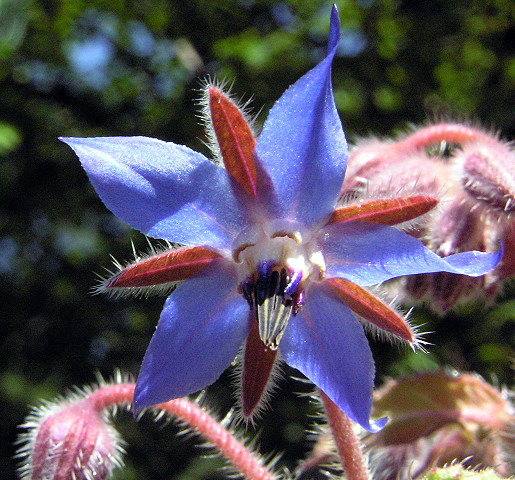
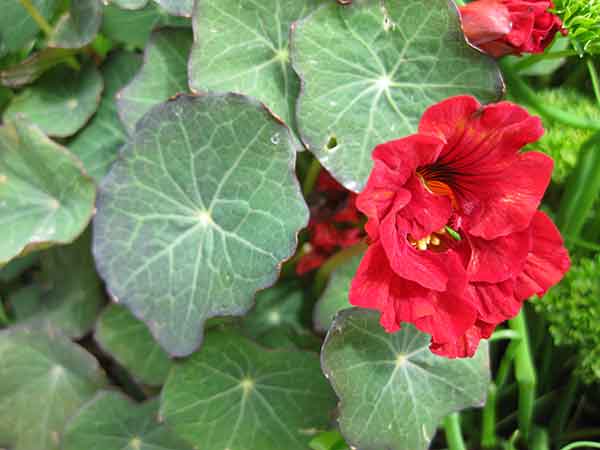
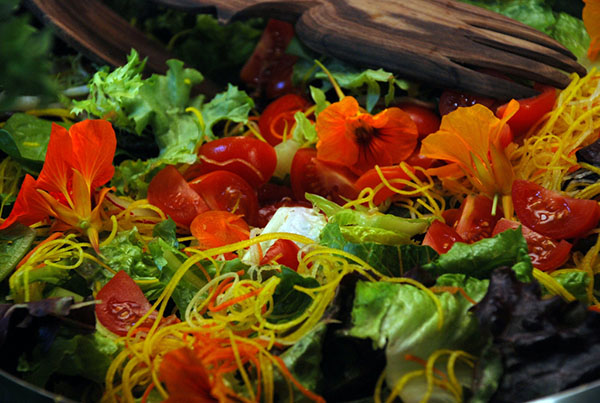
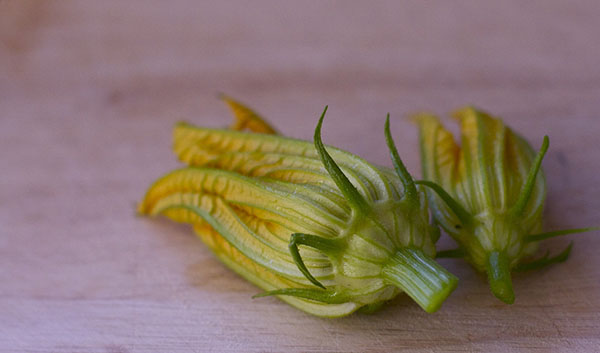
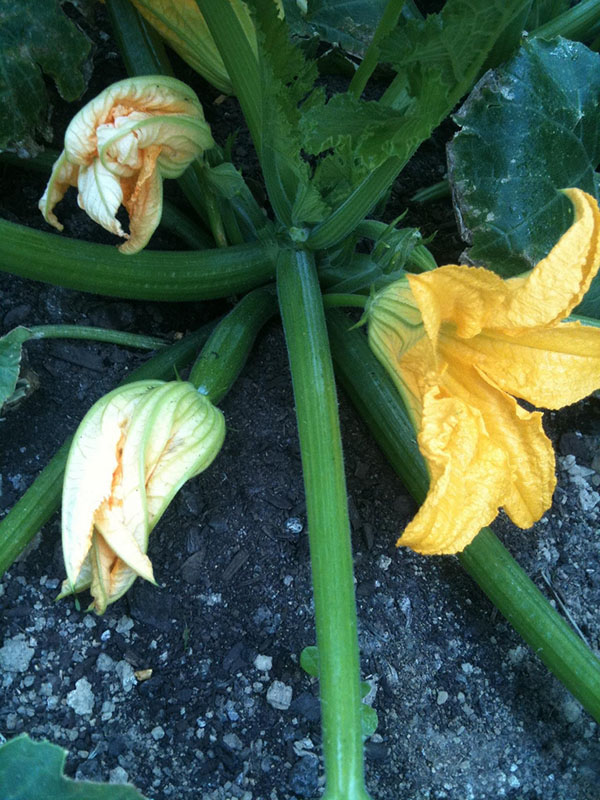



What would you recommend to grow in Gardening Northside garden.
The edible flowers are great addition for every veggie garden. I have eaten such flowers in restaurants but I have no idea where I can buy them for my garden. If you can tell me that will be great. Regards!
http://greenharvest.com.au/SeedOrganic/FlowerSeeds/Flowers.html
In the Philippines, we boiled the flowers then we put patis or fish sauce. The taste is sooo good specially when the flowers are fresh.
Oh my god! They look beautiful.I don’t think I can eat them! This is something I have yet to see with our clients on Melwood. We’ve worked with a lot of gardens and I have never seen edible flowers.Just wow! 🙂
It is interesting to read about Zucchini flowers. Fantastic pics of flowers. This is something different about flowers. Will definitely try growing these flowers.
Great Idea! You get a veggie and a flower garden 2for1 😀 To be honest I have never tried that… It may be a new trend, we would have to deploy a new service for gardening a ?